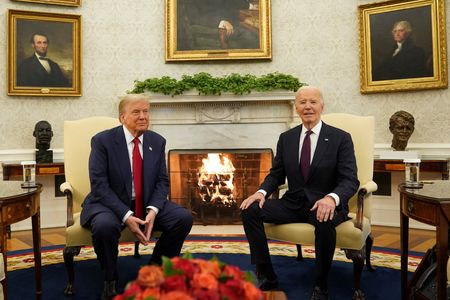By Lili Bayer and Andrew Gray
BRUSSELS (Reuters) – Europe needs to find ways within the next year to fund hundreds of billions of euros in extra military spending to defend against any attack from Russia by the end of the decade, the European Union’s new defence commissioner has said.
Andrius Kubilius, a former prime minister of Lithuania who has just become the European Commission’s first defence chief, told Reuters in an interview that Europe needed a “big bang” of extra funding and weapons buying.
“We need to go big with our procurement,” Kubilius said. “On the other side, we need to have big-bang finances.”
Kubilius’s comments reflect a view among many European leaders that the continent urgently needs to bolster its defences, driven by fears that an EU country could be Russian President Vladimir Putin’s next target after Ukraine.
The imminent return of Donald Trump to the White House and the United States’ increasing focus on China have also raised concerns in Europe that Washington will be less willing or able to help protect it in years to come.
There is broad agreement that Europe should spend more on defence, but EU countries have yet to agree on where to find the money.
Kubilius said a solution needed to be found in the next year, citing intelligence estimates – such as one by Germany’s spy chief – that Russia could be ready to attack a NATO country by the end of the decade at the latest.
“Everything needs to be done before or around 2030,” he said. “We cannot … imagine that we can ask President Putin to delay his plans until we shall be ready.”
Putin has said he has no intention of attacking other European countries. But such declarations do not convince European leaders, especially as Moscow gave similar assurances about Ukraine before invading in 2022.
Kubilius said Europe needs more of everything from tanks and artillery to airlift and refuelling capabilities.
FRONT-LOADING AMONG EU DEFENCE FINANCING IDEAS
The European Commission estimates additional defence investments of around 500 billion euros ($530 billion) are needed over the next decade.
Some leaders have suggested issuing EU defence bonds, which could be repaid from the EU budget. But fiscally frugal countries such as Germany and the Netherlands are opposed.
Kubilius floated the idea of borrowing against future national defence expenditure. “We need to have some kind of front-loading facility, which will be repaid then from national defence spending,” he said.
He said options such as using the European Stability Mechanism (ESM) – the euro zone’s bailout fund – or repurposing money from the bloc’s coronavirus recovery fund and regional development pot could also be on the table.
Another idea under early discussion is to create a fund that a group of willing EU countries along with Norway and Britain would set up with paid-in as well as callable capital, according to officials and diplomats.
It would be modelled on the ESM and borrow money for joint defence projects on the market against its capital.
Such a Special Purpose Vehicle would allow governments to finance costly defence projects without increasing their public debt.
Kubilius noted that the EU had managed to borrow hundreds of billions of euros fast in the COVID-19 crisis and said it should show the same urgency now that it faced a “security pandemic”.
Kubilius is tasked with reducing fragmentation in the European defence market, where national governments often procure their own bespoke systems from national suppliers.
He said he would prioritise helping EU countries meet NATO capability targets as quickly as possible, aggregating demand with major joint contracts and pursuing big collaborative projects such as a European air defence shield.
“The biggest challenge will be to convince member states to take an approach to defence in a different way,” he said.
($1 = 0.9463 euros)
(Additional reporting by Jan Strupczewski; Editing by Kevin Liffey)










